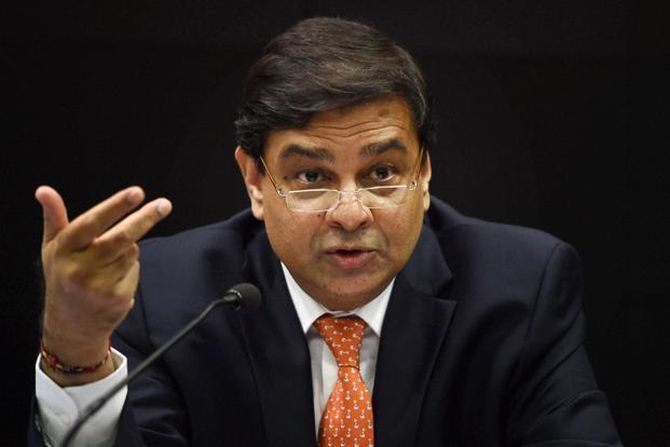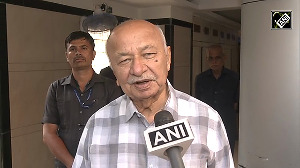The banking sector in India is reeling under Rs 8 lakh crore of non performing assets or bad loans, of which PSU banks alone account for over Rs 6 lakh crore.

The Reserve Bank on Wednesday cut its key lending rate by 0.25 per cent - first time in 10 months – to about 7-year low of 6 per cent, a move which is likely to translate into lower interests rates for home, auto and other loans as also boost economic activity.
Citing record low inflation and retaining its neutral policy stance, RBI reduced the benchmark repurchase (repo) rate, at which it lends to banks, from 6.25 per cent to 6 per cent as was widely expected. This level was last seen in November 2010.
The reverse repo, the rate which banks get for parking funds with RBI, has been readjusted accordingly by similar percentage point to 5.75 per cent.
The marginal standing facility (MSF) rate and the bank rate have also come down to
6.25 per cent.
"Some of the upside risks to inflation have either reduced or not materialised," RBI said.
Retail inflation at 1.5 per cent for June was well below the RBI's 4 per cent target and its projection of 2-3.5 per cent for the first half (April-September) of the current financial year.
"Consequently, some space has opened up for monetary policy accommodation, given the dynamics of the output gap," RBI Governor Urjit Patel said.
Repo rate was last cut by 25 basis points in October 2016 - the first monetary policy review under Patel. It was also the first review by the six-member Monetary Policy Committee (MPC).
The Governor exhorted banks to transmit rate cut to borrowers as there was still room for it. Since January 2015, RBI has reduced repo rate by 200 basis points.
For today's cut, five of the six MPC members, including Patel, voted in favour and called on the government to speed up projects as there is an "urgent need" to boost private investment.
Inflation, according to RBI projections, would rise to 3.5-4.5 per cent between October 2017 and March 2018.
The central bank retained its forecast of 7.3 per cent growth in gross value added in the current fiscal.
"The MPC observed that while inflation has fallen to a historic low, a conclusive segregation of transitory and structural factors driving the disinflation is still elusive," the central bank said in the third bi-monthly monetary policy statement of 2017-18.
While continuing to monitor movements in inflation to ascertain if recent soft readings are transient or if a more durable disinflation was underway, RBI said outlook for agriculture appears robust but underlying growth impulses in industry and services are weakening.
"There is an urgent need to reinvigorate private investment, remove infrastructure bottlenecks and provide a major thrust to the Pradhan Mantri Awas Yojana (PMAY) for housing needs of all," it said.
The government was quick to welcome the rate cut.
Economic Affairs secretary Subhash Chandra Garg said: "We welcome the 25 basis points cut in the repo rate as an important step necessary to converge toward the appropriate real monetary conditions for sustained growth consistent with India’s potential and for stable, moderate inflation."
RBI said it remains focused on its commitment to keep headline inflation close to 4 per cent on a durable basis.
"The decision of the MPC is consistent with a neutral stance of monetary policy in consonance with the objective of achieving the medium-term target for consumer price index (CPI) inflation of 4 per cent within a band of +/- 2 per cent, while supporting growth," Patel said after the third monetary policy review of the current fiscal.
However, the stock market, which had largely factored in the cut, declined. While the BSE index Sensex slipped from record high to end 98.43 points lower at 32,476.74, NSE's Nifty fell 33.15 points to 10,081.50.
On the rate of price rise, Patel said: "The MPC observed that while inflation has fallen to a historic low, a conclusive segregation of transitory and structural factors driving the disinflation is still elusive."
Noting that the trajectory of inflation in the baseline projection is expected to rise from current lows, he said the MPC decided to keep the policy stance neutral and to watch incoming data.
The MPC remains focused on its commitment to keep headline inflation close to 4 per cent on a durable basis, he added.
It has also stressed on an urgent need to reinvigorate private investments, clear infrastructure bottlenecks and provide a major thrust to the PMAY for affordable housing.
RBI said it is working in close coordination with the government to resolve large stressed corporate borrowings and recapitalise public sector banks.
The banking sector in India is reeling under Rs 8 lakh crore of non performing assets (NPAs) or bad loans, of which PSU banks alone account for over Rs 6 lakh crore.
Patel noted that the MPC will continue monitoring movements in inflation to ascertain if recent soft readings are transient or if a more durable disinflation is underway.
"In its assessment of real activity, the MPC noted that while the outlook for agriculture appears robust, underlying growth impulses in industry and services are weakening, given corporate deleveraging and the retrenchment of investment demand," he said.
He further said that there is a scope for banks to cut rates further, especially for those sectors which have not benefited in the past rate cuts.
RBI also said that it is not fully satisfied with the MCLR system and is studying that can move to a market-linked benchmark.
Four MPC members -- RBI Governor, Deputy Governor Viral V Acharya, Chetan Ghate and Pami Dua were in favour of the monetary policy decision.
However, another member Ravindra H Dholakia voted for a policy rate reduction of 50 basis points, while RBI executive director Michael Debabrata Patra voted for status quo.
India Inc welcomed the rate cut with a rider that a steeper rate cut would have spurred investment and growth.
Commenting on RBI policy action, HDFC chairman Deepak Parekh said: "I think it is a good move to the economy. I think it was expected and the MPC has taken a right decision."
Photograph: PTI Photo











 © 2025
© 2025